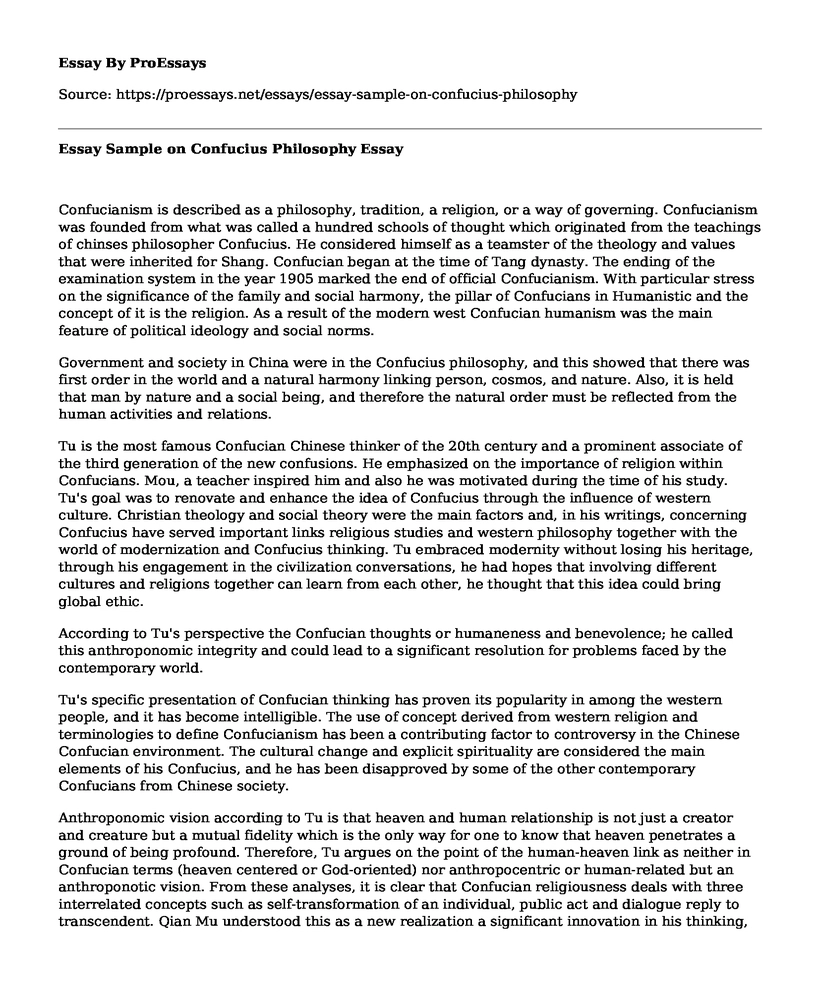Confucianism is described as a philosophy, tradition, a religion, or a way of governing. Confucianism was founded from what was called a hundred schools of thought which originated from the teachings of chinses philosopher Confucius. He considered himself as a teamster of the theology and values that were inherited for Shang. Confucian began at the time of Tang dynasty. The ending of the examination system in the year 1905 marked the end of official Confucianism. With particular stress on the significance of the family and social harmony, the pillar of Confucians in Humanistic and the concept of it is the religion. As a result of the modern west Confucian humanism was the main feature of political ideology and social norms.
Government and society in China were in the Confucius philosophy, and this showed that there was first order in the world and a natural harmony linking person, cosmos, and nature. Also, it is held that man by nature and a social being, and therefore the natural order must be reflected from the human activities and relations.
Tu is the most famous Confucian Chinese thinker of the 20th century and a prominent associate of the third generation of the new confusions. He emphasized on the importance of religion within Confucians. Mou, a teacher inspired him and also he was motivated during the time of his study. Tu's goal was to renovate and enhance the idea of Confucius through the influence of western culture. Christian theology and social theory were the main factors and, in his writings, concerning Confucius have served important links religious studies and western philosophy together with the world of modernization and Confucius thinking. Tu embraced modernity without losing his heritage, through his engagement in the civilization conversations, he had hopes that involving different cultures and religions together can learn from each other, he thought that this idea could bring global ethic.
According to Tu's perspective the Confucian thoughts or humaneness and benevolence; he called this anthroponomic integrity and could lead to a significant resolution for problems faced by the contemporary world.
Tu's specific presentation of Confucian thinking has proven its popularity in among the western people, and it has become intelligible. The use of concept derived from western religion and terminologies to define Confucianism has been a contributing factor to controversy in the Chinese Confucian environment. The cultural change and explicit spirituality are considered the main elements of his Confucius, and he has been disapproved by some of the other contemporary Confucians from Chinese society.
Anthroponomic vision according to Tu is that heaven and human relationship is not just a creator and creature but a mutual fidelity which is the only way for one to know that heaven penetrates a ground of being profound. Therefore, Tu argues on the point of the human-heaven link as neither in Confucian terms (heaven centered or God-oriented) nor anthropocentric or human-related but an anthroponotic vision. From these analyses, it is clear that Confucian religiousness deals with three interrelated concepts such as self-transformation of an individual, public act and dialogue reply to transcendent. Qian Mu understood this as a new realization a significant innovation in his thinking, and he characterized anthroponomic unity as a mutuality between the human and heaven.
Tu is right about the ecological turn and the effort to retrieve, environmental protection, human wellbeing, and spiritual growth as well without discrimination, and the need is filled with vision and sacralization of nature.
Ordinary people are going back to Confucian ideas seeking spiritual nourishment that they think is missing in their life. Confucians have value even in today's life. Chinese cosmology does not cast-off the idea of creator and creature. Even though the Confucian's messages were uttered many years ago, there are things that people in modern society can still hold on...
Cite this page
Essay Sample on Confucius Philosophy. (2022, Dec 17). Retrieved from https://proessays.net/essays/essay-sample-on-confucius-philosophy
If you are the original author of this essay and no longer wish to have it published on the ProEssays website, please click below to request its removal:
- Protection of Perfect Human Research and Principles Essay
- Critical Essay on Our Kids: The American Dream in Crisis
- Theories and Code of Ethics in Practice Essay
- Comparison of Roman Catholicism and Buddhism Essay
- A Civilized Society Is Natural: The Polis and Human Nature in Aristotle's Politics
- Exploring Identity in Carmen Rivera's Play 'La Gringa': The Journey of Maria Elen - Essay Sample
- Uncovering the Universe's Greater Truth - Essay Sample







